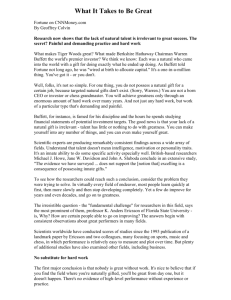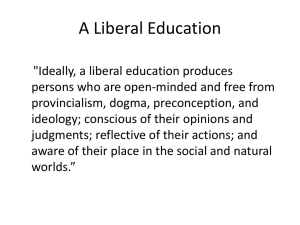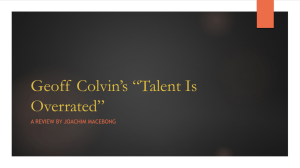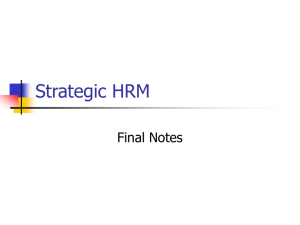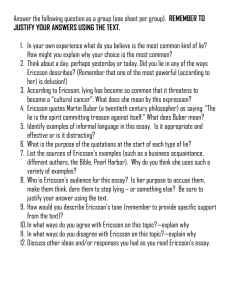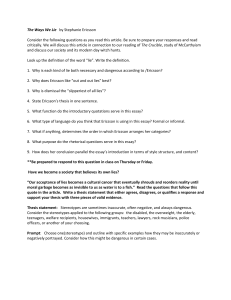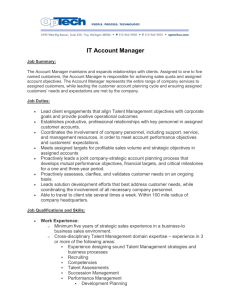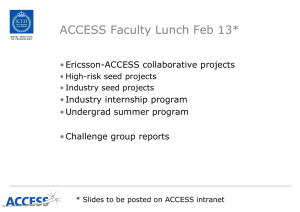CogPsychLecture_Expertise
advertisement
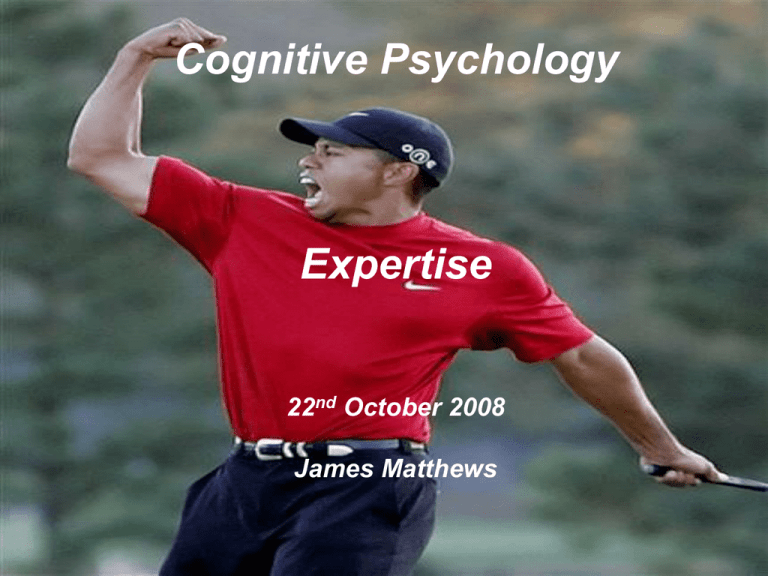
Cognitive Psychology Expertise 22nd October 2008 James Matthews Expertise Today’s Lecture • What is expertise & expert performance • Traditional View of Expertise – Prodigies & Savants – Talent as a predictor of success • Expert Performance • Research Techniques • Theories of Expertise – – – – Recognition Association Theory Template Theory ACT Theory Ericsson’s Deliberate Practice What is expertise? • Innate Talent / Hard Wired? • Acquired / Software? What is expertise? • Expertise – refers to the mechanisms underlying the superior achievement of an expert, i.e. one who has acquired special skill in or knowledge of a particular subject through professional training and practical experience. (Webster’s dictionary) Who is an expert? • An expert can be defined as any person who is wearing a suit, carrying a laptop computer and more than 50km from home ! • An expert is a person who possess specialist knowledge in a designated field (e.g. medical pathology). (Moran, 2004) Perceived Vs Consistent Expert Performance • Criteria for expert performance varies from domain to domain, e.g. chess and the arts. • Outlier – if a person is performing at least 2 standard deviations above the mean level in the population, that individual can be said to performing at an expert level (Ericsson & Charness, 1994). • The distinction between perceived and actual expertise is important as performance of people nominated as experts is not always measurably superior. Perceived Vs Consistent Expert Performance • Numerous studies show that financial stock experts investments yield returns that are not consistently better than the average of the stock market • Experts may have more knowledge but their performance on key tasks is not always reliably better. • We must not assume experts performance is superior, they must demonstrate it is. Traditional View of Expertise • “On the whole the gods do not bestow more than one gift on a person” (Murray, 1989) • Bias towards attributing high abilities to gifts rather than experience. • Galton – first person to investigate expertise – Innate ability – Motivation – Effort Traditional View of Expertise • Gardner (1983) – Proposed 7 types of intelligence – Linguistic, Musical, Spatial, Mathematical, Kinaesthetic, Interpersonal and Intrapersonal • Gardner's theory argues that intelligence, as it is traditionally defined, does not adequately encompass the wide variety of abilities humans display • He believed the salient aspect of innate talent was the potential for achievement and the capacity to learn material relevant to one of the intelligences • Ideas based on the research of savants and prodigies Performance of Prodigies & Savants Prodigy: person, especially a young one, who displays unusual or exceptional talent or intelligence (APA Dictionary, 2009) Savant: Individuals with a low level of general intellectual functioning who are able to perform at high levels in some special tasks (Ericsson & Charness, 1994) Performance of Prodigies & Savants • Talent in Music – Absolute Pitch – 0.01% of population – 1st appears in early childhood – Adults appear unable to attain in spite of training • Hulse (1993) – AP can be acquired by anyone, but only during a limited period of development. – Indivs with AP started music instruction before age of 6 – Studies have shown successful results in teaching AP to 3 – 6 year old children • AP a natural consequence of the right instruction and access to opportunities to play with an instrument. Performance of Prodigies & Savants • Acquisition of skills by prodigies follows the same sequence of stages as other individuals in the same domain BUT attain higher levels quicker and faster. • Most Child Prodigies never attain exceptional levels of performance as adults. • Most exceptional adult performers started instruction early and developed due to high levels of appropriate training (Bloom, 1985). • The role of early instruction and maximal parental support appears to be more important than innate talent. Performance of Prodigies & Savants • Savants - some parents have believed these gifts as coming from God. • Lab studies of performance of savants have shown them to reflect acquired skills. – Naming the day of the week of a certain date is replicatable by a college student after a months training. • One ability that does not seem to be reproducable after a period of training concerns some savants’ ability to play a piece of music after a single hearing. Performance of Prodigies & Savants • Sloboda et al (1985) – Savant able to memorise a new piece of music – Marked difference in success with a conventional vs tonally unconventional piece. – Thus savants may need access to stored patterns and retrieval systems – Many savants are blind so cannot read music so learn by listening which provides motivation for development of certain memory skills • Laboratory research on prodigies and savant provides no conclusive evidence for innate talent. Talent as a predictor of future success • Hardware – Basic elements that cannot be changed through training • Software – Knowledge and strategies that can be readily changed as a function of training and learning • Hardware – Intuitively appealing BUT – Faster reflexes/extreme visual acuity – Age of peak level of performance BUT – Fast twitch Vs Slow twitch fibres – Rift Valley - Kenya Talent as a predictor of future success • Colin Jackson - “The Making of Me” Former World Champion & World Record Holder, 110m Hurdles • A sample of his leg muscle showed that he had 10% super fast twitch fibres, when all previous athletes tested had only 2%. • Family support was also thought to have been highly significant. • Clip showed a stadium in Jamaica with 30000 people cheering on children taking part in an average school sports meet. Talent as a predictor of future success • Ericsson et al (1993) – Elite athletes show faster reaction times to situations within their own domains than novices or non expert – No difference between experts and novices on reaction times for simple lab tasks • This finding is replicated across numerous domain, e.g. chess Talent as a predictor of future success • Physiological and Anatomical attributes can change dramatically in response to physical training Percy Montgomery, World Cup Winner, SA • Height is the one exception… – UK Sports search for tall people for 2012 Talent as a predictor of future success • Overall little empirical evidence supports the talent view of expertise and expert performance. Expert Performance • Remember financial example… – We must not assume experts performance is superior, they must demonstrate it is. • Key challenge is to identify particular well-defined tasks that frequently occur and that capture the essence of expert performance in a specific domain. • De Goot – pioneering research to capture expert performance De Goot’s Research • De Goot – Chess Master • Determined that the ability to play chess is best captured in the task of selecting the next move for a given chess position taken from the middle of a game between two chess masters. • Presented chessboard configurations to chess playing subjections for periods of 2 – 15 seconds. • Found that experts were superior to other players in ability to reproduce accurately the location of pieces. De Goot’s Research Chase and Simon • Chase and Simon (1973) replicated De Goot’s findings and discovered something new: • The superior STM performance of chess experts was confined to meaningful (i.e. game specific) chess patterns • It did not appear when unstructured “scrambled” or random patterns were presented Chase and Simon Theories of Expertise • Suggested that the better performance of experts is not due to any general memory advantage (such as photographic memory) • Instead they proposed that experts superior STM performance was due to their ability to recognise configurations of their chess pieces on the basis of their knowledge of vast numbers of chess patterns (e.g. 50,000 – 100,000) Recognition – Association Theory • Became known as the “Recognition – Association” theory • A chess position is perceived by a skilled player in terms of groups of 2 – 3 chess pieces corresponding to familiar patterns (chunks) in LTM • With extensive experience and learning, the size and number of chunks in LTM can increase. • Each of these chunks is thought to be associated with plausible moves • Therefore experts superior memory for chess patterns attributed to their ability to perceive the board in terms of chunks and to hold labels in corresponding to each chunk in working memory. Research Methods in Expertise • In-depth Interviews: – May lead to grounded theory, where researchers build a conceptual model inductively from data yielded from participants rather than deductively • Think aloud verbal protocols: – Required to talk about or give running commentary on their thoughts and actions as they tackle a problem – Some limitations: • Editing problem from sheer volume of data • Protocols limited to consciously attributable processes • People more self conscious / guarded? Research Methods in Expertise • Thought Sampling: – Involves equipping athletes with electronic bleepers during domain relevant situations and cueing them to randomly pay attention to their thoughts at that time – Good ecological validity • Pattern recall and recognition tasks: – De Goot and Chase and Simon’s work • Eye – tracker technology: – Saccadic Movements – high speed jumps – Smooth Pursuit Movements – help focus on a given target – Research supports that experts display a more efficient visual search strategy than less skilled counterparts – Cricket research (Land and McLeod, 2000) Back to theories of expertise • It is wrong to assume that the only characteristic of expertise is superior memory • Holding & Reynolds (1982) argue that experts also possess superior strategic processing skills to novices Theories of Expertise Template theory • Experts organise chunks into meaningful complex structures known as templates • Chess pieces might be remembered as being in a strong, weak or neutral position as a whole • Templates can hold larger amounts of information than simple chunks • Thinking can be directed strategically Template Theory Charnes et al. (2001) presented chess boards to experts and novices Eye movements were recorded for the first second after presentation Even in this short time experts were more likely than novices to fixate on tactically relevant pieces (80% v 64%) Global structures of game patterns seem to be stored by experts Template Theory • McGregor & Holmes (2002) showed chess boards to experts and novices • Participants had to indicate if they had seen a particular board before or not • Experts were better at realising that they had not seen a particular board if 1 important piece was shifted rather than if the whole board was translated one space over. • Evidence that the way the game is developing, and associated strategies are all coming into play Template Theory • Evaluation: • It is not clear from template theory what the precise information is that is being stored. • Attack / defense relations are more memorable than piece location, but this does not help in deciphering what the contents of memory are… Andersons ACT Theory • Adaptive Control of Thought theory proposes 3 connected systems at work in experts: • Declarative memory (semantic network) • Procedural memory (simplifying decision making) • Working memory Andersons ACT Theory • As a novice becomes more expert. . . • There is knowledge compilation, resulting in a shift from declarative to procedural memory • Proceduralisation is where production rules (if…. then) are drawn up to make decisions and take action more quickly • Composition improves performance by reducing a repeated sequence of actions to a single action Andersons ACT Theory • Zbrodoff (1995) had participants answer questions about the alphabet • e.g. S + 4 = ? Ans: W • Initially participants were quicker to answer S + 2 than S +4 • This is because initially participants were running through the alphabet in their head • After practice the times became equal as participants began to rely automatically on past experience Andersons ACT Theory • Evaluation: • There is good evidence of a shift from declarative to procedural memory as people become well practiced at a particular task • This model deals well with unvarying procedures (touch typing), but does not say much about creative/adaptive expertise (like that seen in scientific theory) Ericsson’s Theory of Deliberate Practice • Ericsson believed that practice of the right sort was not only necessary but also sufficient for memory expertise to develop • A wide range of expertise can be developed through deliberate practice, which has 4 aspects: – The task is at an appropriate level of difficulty – The learner is provided with informative feedback re their performance – The learner has sufficient opportunities for repetition – It is possible for the learner to correct his / her errors Ericsson’s Theory of Deliberate Practice • What is controversial is Ericsson’s belief that innate talent has no influence on expert performance. • It is only for height that innate characteristics have been shown to matter (Remember London 2012) • Evidence of this position: • Ericsson and Chase (1982) - Digit Span Task – Extensive practice on task where numbers had to be recalled immediately – 7 digits recalled on average at start – 80 digits recalled after practice for an hour a day for 2 years – No cross over to letter or word spans – Increased his span by organising chunks into a hierarchial retrieval structure Ericsson’s Theory of Deliberate Practice • According to Ericsson and Lehman (1996), what’s important is the amount of deliberate practice as compared to the amount of sheer practice • Think of kids who spend hours on the road kicking a football but never make professional or representative level • Ericsson et al (1993) – Violinists at German music academy – Key difference between violinists of varying ability was the amount of deliberate practice – 7,500 hours engaged in deliberate practice for Experts Violinists – 5,300 hours engaged in deliberate practice for Good Violinists – Perfecting their skills as compared to mindlessly repeating elementary drills Ericsson’s Theory of Deliberate Practice • Is innate ability or intelligence unimportant in the development of expertise? • Ceci and Liker (1986) – Harness Racing Study – 14 experts and 16 non experts, – IQs’ varied between 80 and 130 in both groups – Performance indicated that experts performed better than non experts regardess of IQ level • Ceci and Liker (1986) suggested “that IQ is unrelated to real world forms of cognitive complexity that would appear to conform to some of those that scientists regard as hallmarks of intelligence behaviour” Ericsson’s Theory of Deliberate Practice • Evaluation: • Evidence indicates that deliberate practice is necessary for expertise BUT the support that it is sufficient for expertise is somewhat less consistent Ericsson’s Theory of Deliberate Practice • Some Limitations: • Lots of evidence that DP is not the only factor. Innate ability predicts long term career success in many occupations (Gottfredson, 1997) • The notion that innate talent is irrelevant seems implausible (Sternberg, 2001) • It’s the highly intelligent or talented individuals who are willing to put in the hours of practice – Motivation… Ericsson’s Theory of Deliberate Practice • Some Limitations: • If nearly all experts in the field have enormous talent, then it is not surprising that individual differences in talent do not predict expertise (e.g. height in basketball which does not predict performance) Expertise Today’s Lecture • What is expertise & expert performance • Traditional View of Expertise – Prodigies & Savants – Talent as a predictor of success • Expert Performance • Research Techniques • Theories of Expertise – – – – Recognition Association Theory Template Theory ACT Theory Ericsson’s Deliberate Practice Readings • Eysenck & Keane: Chapter 13 • Ericsson, K.A & Charness, N. (1994). Expert Performance – Its Structural and Acquisition. American Psychologist, 8, 725 – 747. • Moran, A.P (2004). Sport & Exercise Psychology. A Critical Introduction. • Matlin: Chapter 10 Articles to Read • Miller, L.K. (1998)The Savant Syndrome: Intellectual Impairment and Exceptional Skill. Psychological Bulletin, 125, 31-45. • Helsen, W.F., Hodges, N.J., Van Winckel, J. & Starkes, J.L. (2000). The roles of talent, physical precocity and practice in the development of soccer expertise. Journal of Sports Sciences, 18, 727 – 736. Extinction • Marzi et al. (2001). What exactly is extinguished in unilateral extinction? Neurophysiological evidence. Neuropsychologia, 1354 – 1366. • Rees et al. (2000). Unconscious activation of the visual cortex in the damaged right hemipshere of a parietal patient with extinction. Brain, 1624 – 1633. • Both introductions give good basic explanations.
